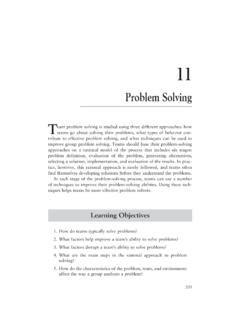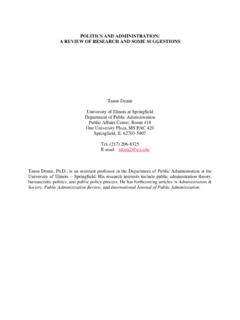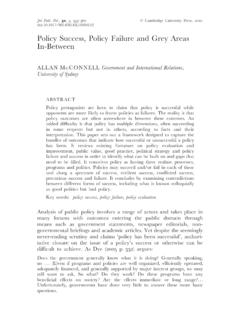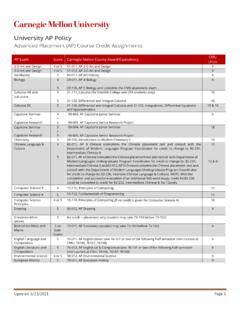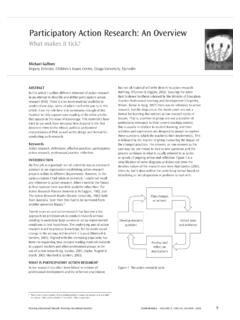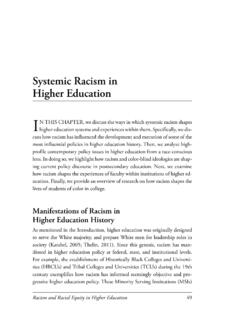Transcription of Constructivist Teaching/Learning Theory and Participatory ...
1 Journal of Curriculum and Teaching Vol. 6, No. 1; 2017 Published by Sciedu Press 110 ISSN 1927-2677 E-ISSN 1927-2685 Constructivist Teaching/Learning Theory and Participatory Teaching Methods Sithara YJN Fernando1 & Faiz MMT Marikar1,* 1 General Sir John Kothelawala Defence University, Ratmalana, Sri Lanka *Correspondence: General Sir John Kothelawala Defence University, Ratmalana, Sri Lanka. E-mail: Received: February 12, 2017 Accepted: March 1, 2017 Online Published: April 27, 2017 URL: Abstract Evidence for the teaching involves transmission of knowledge, superiority of guided transmission is explained in the context of our knowledge, but it is also much more that.
2 In this study we have examined General Sir John Kotelawala Defence University s cadet and civilian students response to Constructivist learning Theory and Participatory teaching methods, especially concepts and knowledge on the learning platform in the Defence University. Target population of this study represents 41 students. All students were given a questionnaire related to Constructivist learning Theory and Participatory teaching methods. The claims of Constructivist Teaching/Learning Theory that this paper has singled out are the following: 1) learning is an active experience; 2) the ideas students hold about the subject and topic being taught will form a part of their learning experience; and 3) learning is socially and culturally rooted.
3 Recent developments in Constructivist Teaching/Learning Theory was explained and briefly described in this paper. Keyword: constructive learning; teaching; cadet 1. Introduction Teaching involves transmission of knowledge, but it is also much more than that. Theories of teaching have to be sensitive to the processes through which students acquire knowledge, or in other words how students learn. It is in this aspect related to the processes through which students acquire knowledge that Constructivist teaching and learning Theory have much to offer.
4 Constructivist teaching and learning Theory advocates a Participatory approach in which students actively participate in the learning process. For Ernest von Glaserfeld constructivism as a Theory of knowledge puts forward the following two principles: knowledge is not passively received but actively built up by the cognizing subject; and the function of cognition is adaptive and serves the organization of the experiential world, not the discovery of ontological reality (VonGlaserfeld 1989). The core of the Constructivist approach to teaching and learning as expounded by von Glaserfeld is that the student or the learner is an active participant in the learning process and that the teacher has to take account of that in the teacher s effort to facilitate learning.
5 He also makes an effort to link the Theory of constructivism to the practice of teaching (VonGlaserfeld 1989). Svein Sjoberg identifies the core ideas of the Constructivist approach to learning as knowledge is actively constructed by the learner, not passively received from the outside (Sjoberg 2007). Learning is something done by the learner, not something that is imposed on the learner as the key factor. According to Jia Shen Participatory Learning Approach (PLA) incorporates several opportunities for designing problems, answering them, grading them, disputing results, and in observing/reading what everyone else does (Shen, Wu et al.)
6 2004). PLA can help a student to view a given subject from different points of view. PLA involves the designing of problems by students. The designing of problems by students can improve their grasp on the subject and can begin to focus their attention on the assessment of knowledge on the subject. The input of students can also help the instructor or teacher improve the course materials. The progress of the PLA process through problem design, solution design, solution evaluation and dispute arbitration can facilitate a thorough internalization or absorption of the given subjects by the students.
7 The reading of other students work can facilitate a broader understanding of the given subjects. Journal of Curriculum and Teaching Vol. 6, No. 1; 2017 Published by Sciedu Press 111 ISSN 1927-2677 E-ISSN 1927-2685 Constructivist theories of teaching and learning raise the following interesting question: does teaching involve the transmission of knowledge or the facilitation of learning? This question leads to a further question, who is a teacher? In the authors view a teacher is a person who possesses expert knowledge on the subject he/she is teaching by virtue of his/her academic qualifications.
8 One can safely assert that the teacher possesses more knowledge about the subject he/she is teaching than the average student. This entails that at some level teaching must involve transmission of expert knowledge from the teacher to the student. However, what the Constructivist literature on teaching and learning has to add to this is that learning is an active experience. One can agree with the Constructivist literature on the point that the learning experience is greatly enhanced when the student is an active participant in the learning the process.
9 It is here that the teacher s role as a facilitator of learning becomes important. The teacher can play a valuable role in facilitating active learning by students. Therefore, in the author s view the answer to the first question is that teaching involves both the transmission of knowledge and the facilitation of learning. Since one of the authors has been trained in the social sciences another important question that comes to mind is what is the relevance of the Constructivist approach to teaching and learning in the social sciences?
10 One of the authors has been trained in the social science discipline of International Relations (IR). Any academic discipline to be worthy of its status must have theories of its own. IR Theory can be regarded as a branch of Social Science Theory . Theory in the Social Sciences is essentially contested. This means that in IR, as in the other Social Sciences, there is more than one Theory . One of the most important questions theories of International Relations try to answer is the following: why do States go to war with other States?










